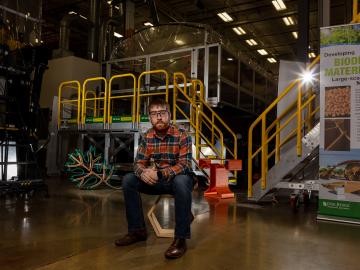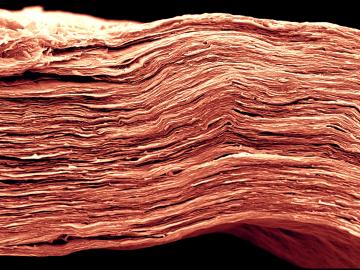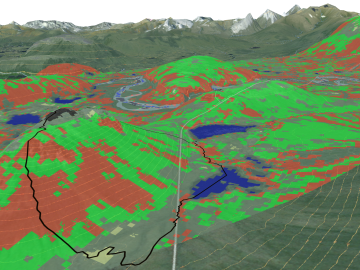
Filter News
Area of Research
- Advanced Manufacturing (19)
- Biology and Environment (40)
- Building Technologies (2)
- Computational Biology (1)
- Computational Engineering (3)
- Computer Science (13)
- Energy Science (139)
- Energy Sciences (1)
- Fusion and Fission (10)
- Fusion Energy (8)
- Isotopes (20)
- Materials (71)
- Materials for Computing (11)
- Mathematics (1)
- National Security (23)
- Neutron Science (21)
- Nuclear Science and Technology (11)
- Nuclear Systems Modeling, Simulation and Validation (1)
- Quantum information Science (4)
- Supercomputing (58)
News Type
News Topics
- (-) 3-D Printing/Advanced Manufacturing (96)
- (-) Advanced Reactors (27)
- (-) Biomedical (41)
- (-) Chemical Sciences (57)
- (-) Clean Water (23)
- (-) Computer Science (119)
- (-) Cybersecurity (26)
- (-) Energy Storage (88)
- (-) Isotopes (38)
- Artificial Intelligence (60)
- Big Data (37)
- Bioenergy (65)
- Biology (74)
- Biotechnology (21)
- Buildings (46)
- Composites (26)
- Coronavirus (34)
- Critical Materials (25)
- Education (3)
- Element Discovery (1)
- Emergency (1)
- Environment (126)
- Exascale Computing (17)
- Fossil Energy (2)
- Frontier (20)
- Fusion (36)
- Grid (45)
- High-Performance Computing (55)
- Hydropower (8)
- Irradiation (2)
- ITER (6)
- Machine Learning (37)
- Materials (105)
- Materials Science (105)
- Mathematics (8)
- Mercury (9)
- Microelectronics (1)
- Microscopy (39)
- Molten Salt (8)
- Nanotechnology (47)
- National Security (38)
- Neutron Science (91)
- Nuclear Energy (63)
- Partnerships (35)
- Physics (46)
- Polymers (28)
- Quantum Computing (19)
- Quantum Science (48)
- Security (20)
- Simulation (27)
- Space Exploration (13)
- Statistics (2)
- Summit (32)
- Transportation (74)
Media Contacts

Alex Roschli is no stranger to finding himself in unique situations. After all, the early career researcher in ORNL’s Manufacturing Systems Research group bears a last name that only 29 other people share in the United States, and he’s certain he’s the only Roschli (a moniker that hails from Switzerland) with the first name Alex.

OAK RIDGE, Tenn., March 20, 2019—Direct observations of the structure and catalytic mechanism of a prototypical kinase enzyme—protein kinase A or PKA—will provide researchers and drug developers with significantly enhanced abilities to understand and treat fatal diseases and neurological disorders such as cancer, diabetes, and cystic fibrosis.

The unique process of accepting a new supercomputer is one of the most challenging projects a programmer may take on during a career. When the Oak Ridge Leadership Computing Facility’s (OLCF’s) Verónica Melesse Vergara came to the United States from Ecuador in 2005, she never would have dreamed of being part of such an endeavor. But just last fall, she was.



OAK RIDGE, Tenn., March 4, 2019—A team of researchers from the Department of Energy’s Oak Ridge National Laboratory Health Data Sciences Institute have harnessed the power of artificial intelligence to better match cancer patients with clinical trials.

Oak Ridge National Laboratory scientists have created open source software that scales up analysis of motor designs to run on the fastest computers available, including those accessible to outside users at the Oak Ridge Leadership Computing Facility.
OAK RIDGE, Tenn., Feb. 12, 2019—A team of researchers from the Department of Energy’s Oak Ridge and Los Alamos National Laboratories has partnered with EPB, a Chattanooga utility and telecommunications company, to demonstrate the effectiveness of metro-scale quantum key distribution (QKD).

A team of scientists led by Oak Ridge National Laboratory used machine learning methods to generate a high-resolution map of vegetation growing in the remote reaches of the Alaskan tundra.



